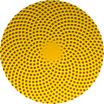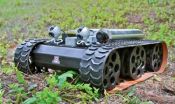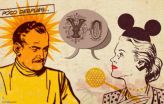Research universities play a major role in national security
2011-02-20
(Press-News.org) The United States' preoccupation with national security, including counterterrorism, counterintelligence, and cyber security, is also a concern of higher education, according to Graham Spanier, president of Penn State University.
Spanier, who chairs the National Security Higher Education Advisory Board (NSHEAB), addressed attendees today (Feb. 18) at the annual meeting of the American Association for the Advancement of Science in Washington, D.C., stressing that higher education is part of the national security solution.
"The National Security Higher Education Advisory Board consists of 20 research university presidents and the heads of two higher education associations in cooperation with many federal agencies," said Spanier. "We serve as a collaborative group that can foster communications and cooperation through research, education and public awareness to further aid our nation's security interests."
Created in 2005, NSHEAB discusses issues of national security to promote understanding between higher education, the FBI and other federal agencies, such as the Department of Commerce, the Department of State, the Department of Defense, and intelligence agencies. The NSHEAB is administered by the FBI.
Spanier noted that universities like Penn State – which enrolls more than 97,000 students -- host a large number of foreign students and academic visitors, as well as high profile national and international visitors.
Universities also frequently have high concentrations of people in limited spaces. During many Saturdays each fall, Penn State becomes the third largest city in Pennsylvania when it hosts football games in Beaver Stadium, something that heightens concerns about security. Universities have also been targets for ecoterrorists and animal rights terrorists. Awareness, vigilance, and a spirit of cooperation with local, state, and federal agencies are necessary for the success and safety of a research university.
The NSHEAB tries to help federal agencies better understand the unique culture, traditions and practices of higher education, including the culture of openness and academic freedom and the importance of international collaboration.
While universities may be concerned about their own security, they also produce vast amounts of research for the agencies involved in protecting the country. The relatively new area of cyber security includes everything from viruses, worms and trojans to identity theft, denial of service, hacking and cracking. Universities are sometimes conduits for these attacks, but their faculty researchers and information technology staff are also working to prevent these attacks. From research in cyber security to non-lethal weapons, forensics applications and devices to sniff out explosives, universities supply the agencies that protect the nation with the methods they need to meet current threats.
INFORMATION:
END
ELSE PRESS RELEASES FROM THIS DATE:
2011-02-20
Hackensack, NJ (Feb 18, 2011) – James C. Wittig, M.D., chief of the division of skin and sarcoma cancer at the John Theurer Cancer Center at Hackensack University Medical Center will present eleven different educational videos on innovative approaches to orthopedic oncology at the upcoming American Academy of Orthopaedic Surgeons Conference. Dr. Wittig is known for inventing some of the most-used best practices in limb-sparing surgery. In 2009, he and his colleagues began filming their surgeries so that other surgeons across the globe could use their radically innovative ...
2011-02-20
WASHINGTON, D.C. – Asthma diagnosis and management vary dramatically around the world, said David Van Sickle, an honorary associate fellow at the University of Wisconsin School of Medicine and Public Health, during a presentation today at the annual meeting of the American Association for the Advancement of Science (AAAS).
Asthma affects an estimated 8 percent of Americans, and about 300 million people around the world, but varying practices in diagnosis and treatment have global implications in understanding a widespread, chronic condition, says Van Sickle, who applies ...
2011-02-20
Infants raised in households where Spanish and Catalan are spoken can discriminate between English and French just by watching people speak, even though they have never been exposed to these new languages before, according to University of British Columbia psychologist Janet Werker.
Presented today at the American Association for the Advancement of Science (AAAS) Annual Meeting in Washington, DC, Werker's latest findings provide further evidence that exposure to two native languages contributes to the development of perceptual sensitivity that extends beyond their mother ...
2011-02-20
Predatory fish such as cod, tuna, and groupers have declined by two-thirds over the past 100 years, while small forage fish such as sardine, anchovy and capelin have more than doubled over the same period, according to University of British Columbia researchers.
Led by Prof. Villy Christensen of UBC's Fisheries Centre, a team of scientists used more than 200 marine ecosystem models from around the world and extracted more than 68,000 estimates of fish biomass from 1880 to 2007. They presented the findings today at the American Association for the Advancement of Science ...
2011-02-20
When people on airplanes ask Alan Newell what he works on, he tells them "flower arrangements."
He could also say "fingerprints" or "sand ripples" or "how plants grow."
"Most patterns you see, including the ones on sand dunes or fish or tigers or leopards or in the laboratory – even the defects in the patterns – have many universal features," said Newell, a Regents' Professor of Mathematics at the University of Arizona.
"All these different systems exhibit strikingly similar features when it comes to the patterns they form," he said. "Patterns arise in systems when ...
2011-02-20
WASHINGTON, D.C. — Introductory college science classes need to improve their coverage of issues related to sustainability, a noted chemistry educator told the American Association for the Advancement of Science today.
"Across the nation, we have a problem," said Catherine Middlecamp, a distinguished faculty associate in chemistry at the University of Wisconsin-Madison. "We are using a 20th-century curriculum, and this is the 21st century."
Students, Middlecamp says, want a curriculum that will prepare them for upcoming challenges related to climate change, pollution ...
2011-02-20
Cost-effectiveness analysis should play a bigger role in the American health care system, argued a University of Chicago researcher Friday at the annual conference of the American Association for the Advancement of Science.
"The effects of science and technology on health care costs depend on the policy context in which those technologies are developed and applied," said David Meltzer, Associate Professor of Medicine, in his presentation, "Policies to Mobile Technology and Science for Health Care Cost Control."
Meltzer, who also holds a PhD in economics, pointed out ...
2011-02-20
Adelaide researchers have taken a step closer to the development of a universal flu vaccine, with results of a recent study showing that a vaccine delivered by a simple nasal spray could provide protection against influenza.
University of Adelaide researcher Dr Darren Miller and colleagues have successfully trialled a synthetic universal flu vaccine in mice. The results have appeared this month in a paper in the Journal of General Virology.
"Current flu vaccines rely on health authorities being able to predict what the forthcoming viral strain is going to be, and reformulating ...
2011-02-20
TUCSON, Ariz. (February 18, 2011) -- A University of Arizona College of Engineering researcher and his team who are developing intelligent robots for planetary exploration will be featured in a segment of an upcoming episode of the science program "WaveLengths."
The robots will be featured on the episode premiering Thursday night, February 24 at 8:30 p.m. MST on public television KUAT Channel 6. "WaveLengths" is a quarterly science program hosted by BIO5 Institute Member Dr. Vicki Chandler.
The exploration robots are part of a tier-scalable, reconnaissance system prototype ...
2011-02-20
A study by the University of the Basque Country (UPV/EHU) has carried out the first Spanish study into the emotional differences between the sexes and generations in terms of forgiveness. According to the study, parents forgive more than children, while women are better at forgiving than men.
"This study has great application for teaching values, because it shows us what reasons people have for forgiving men and women, and the popular conception of forgiveness", Maite Garaigordobil, co-author of the study and a senior professor at the Psychology Faculty of the UPV, tells ...
LAST 30 PRESS RELEASES:
[Press-News.org] Research universities play a major role in national security


